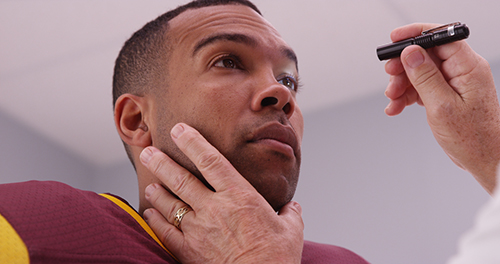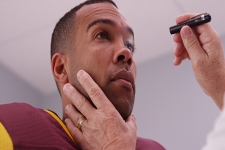
What Is a Concussion?
Before we go any further, let’s start with the basics – what is a concussion? According to the CDC, a concussion is a type of traumatic brain injury that is caused by a blow to the head (or via a hit to the body) that causes the head and brain to move quickly back and forth. This type of fast movement can cause the brain to “bounce around” in the skull which, in turn, can create chemical changes in the brain and sometimes stretching and damaging the brain cells.
How to Spot a Concussion?
First and foremost, DO NOT TRY TO DIAGNOSE A CONCUSSION – OR JUDGE ITS SEVERITY – ON YOUR OWN. A health care provider should be the one to assess your child or teen for a possible concussion.
One of the scary parts of a concussion is that it’s possible that you may not know how serious the concussion is at first, and some symptoms may not show up for hours or days. It’s also important to note that there are no “concussion-proof” helmets out there. Even with a helmet, it’s important for kids to avoid hits to the head. Kids who show or report one or more of the following symptoms may have a concussion or other serious brain injury. So, if your child…
- Appears dazed or stunned
- Forgets an instruction, is confused about an assignment or position, or is unsure of the game, score, or opponent
- Moves clumsily
- Answers questions slowly
- Loses consciousness (even briefly)
- Shows mood, behavior, or personality changes
- Can’t recall events before or after a hit or fall
- Reports symptoms of a headache or “pressure” in head; nausea or vomiting; balance problems or dizziness, or double or blurry vision; are bothered by light or noise; a feeling of being sluggish, hazy, foggy, or groggy; confusion, or concentration or memory problems; just not “feeling right,” or “feeling down,”
…then it’s possible that they have sustained a concussion. However, the only way to know for sure is to have them examined by a medical professional – either in the ER or by your orthopaedic surgeon – as soon as possible.
If your child is diagnosed with a concussion, their return to school and sports should be gradually and carefully managed and monitored by a health care provider. Kids who continue to play while having concussion symptoms or who return to play too soon (while the brain is still healing) have a greater chance of getting another concussion. A repeat concussion that’s sustained while the brain is still healing from the initial injury can be extremely serious – to the point of lifelong impairment.
If you think your child may have a concussion, get them to the doctor for a proper evaluation ASAP. If they are diagnosed with a concussion, your doctor will guide you in regards to recovery and returning to activity, regardless of what that activity might be!

